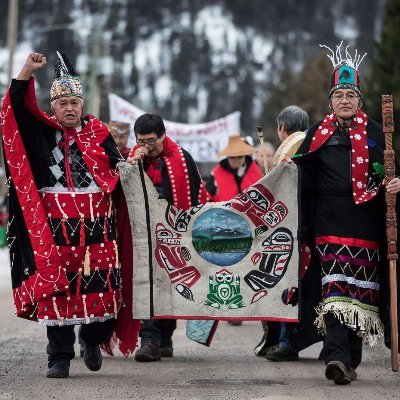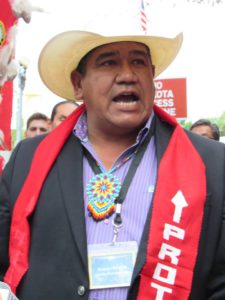
- Details
- By Native News Online Staff
EAGLE BUTTE, S.D. — Cheyenne River Sioux Tribe Chairman Harold Frazier declared his Tribe’s solidarity with the Wet’suwet’en Nation, a First Nation in Canada, that is currently fighting the plan to route an oil pipeline through its reserve.
 Cheyenne River Sioux Tribal Chairman Harold Frazier in Washington after 2016 White House Tribal Nations Conference. Native News Online photo by Levi Rickert
Cheyenne River Sioux Tribal Chairman Harold Frazier in Washington after 2016 White House Tribal Nations Conference. Native News Online photo by Levi Rickert
Chairman Frazier made the following statement:
“Across the line known as the US/Canadian border our Wet’suwet’en relatives have been engaging in the same struggle all of us are forced to endure. The invasion of our lands, the robbing of our resources, the raping of our people and to the destruction of our land.
Many of the tribes have stood next to their relatives and shown solidarity in resistance. The Mohawks are among the many who are likely to suffer from paramilitary ‘police’ actions adding human casualties to the damages done to our land. Many of the lands currently under siege were agreed to long ago, yet the greed that preys on this land is worse than any other virus in existence.
“This tragedy has been played out many times in far and remote places. Let us show our neighbors that we see them. We see the injustice and the crime on a peaceful people, who are only guilty of standing up for Unci Maka (Grandmother Earth).
“The Cheyenne River Sioux Tribe stands in solidarity with our relatives in Canada for they have stood with us. If we do not stand up for our planet and relatives, we no longer deserve the right to be a part of this planet or have relatives that care about us.”
More Stories Like This
Native News Weekly (August 25, 2024): D.C. BriefsUS Presidents in Their Own Words Concerning American Indians
Native News Weekly (December 14, 2025): D.C. Briefs
Wounded Knee Massacre Site Protection Bill Passes Congress
Two Murdered on Colville Indian Reservation
Help us defend tribal sovereignty.
At Native News Online, our mission is rooted in telling the stories that strengthen sovereignty and uplift Indigenous voices — not just at year’s end, but every single day.
Because of your generosity last year, we were able to keep our reporters on the ground in tribal communities, at national gatherings and in the halls of Congress — covering the issues that matter most to Indian Country: sovereignty, culture, education, health and economic opportunity.
That support sustained us through a tough year in 2025. Now, as we look to the year ahead, we need your help right now to ensure warrior journalism remains strong — reporting that defends tribal sovereignty, amplifies Native truth, and holds power accountable.
 The stakes couldn't be higher. Your support keeps Native voices heard, Native stories told and Native sovereignty defended.
The stakes couldn't be higher. Your support keeps Native voices heard, Native stories told and Native sovereignty defended.
Stand with Warrior Journalism today.
Levi Rickert (Potawatomi), Editor & Publisher

